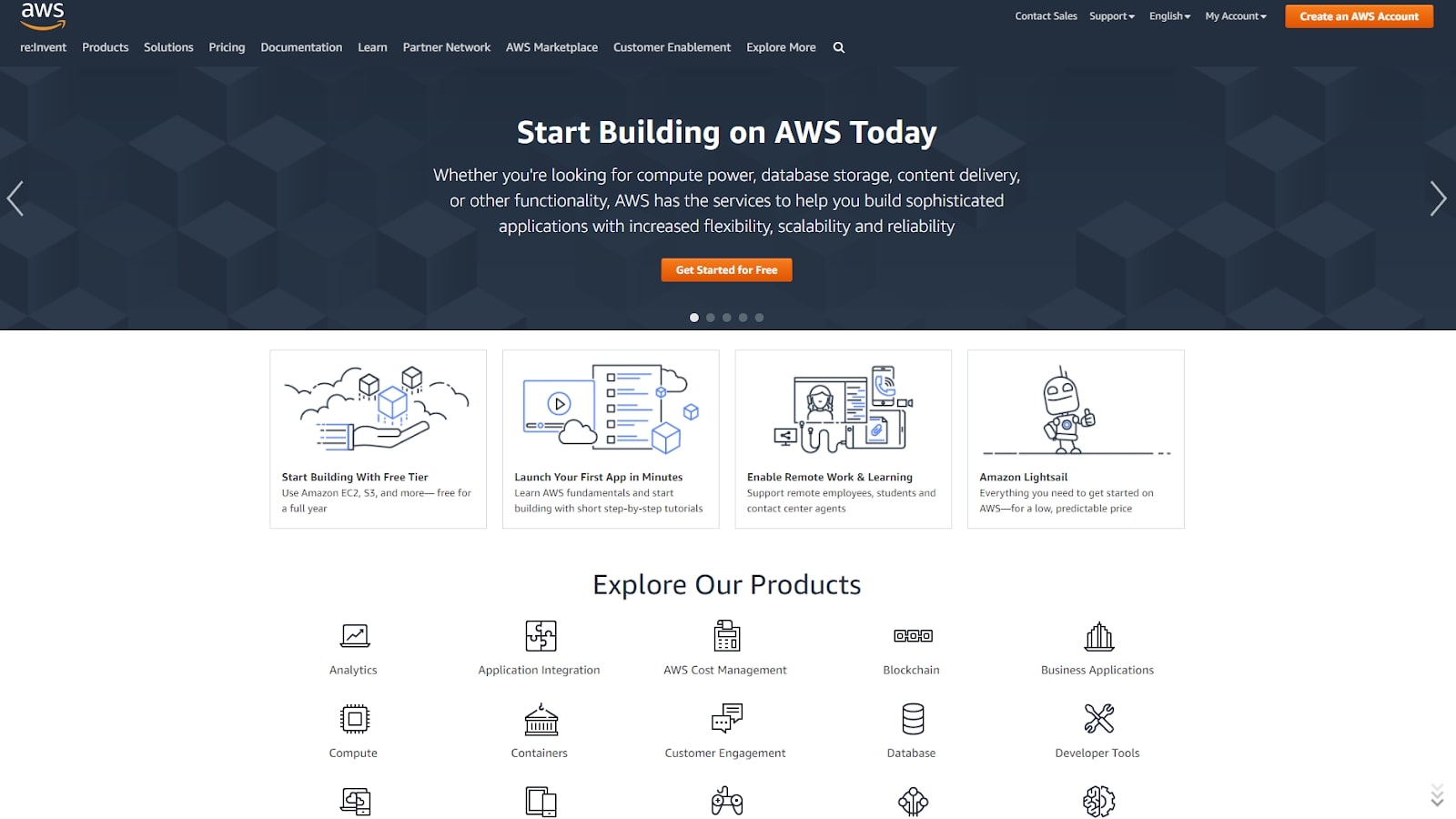AWS hosting: What is it, and how does it work?

Whether you’re planning your first website or are a seasoned veteran with dozens under your belt, every website owner faces the important question of which web hosting provider to choose. Finding and choosing one of the best web hosting services for your needs isn’t easy, not least because you have a lot of different options to choose from. Learning about them all is overwhelming.
To help with that task, this article will outline one of the biggest players in the hosting space to consider: AWS hosting.
AWS hosting: What is it?
Amazon Web Services (AWS) hosting refers to the hosting services provided by the global ecommerce giant Amazon. AWS hosting is one service within the larger AWS platform, which provides an array of cloud-based products (over 200 altogether). In addition to web hosting, some of its top products are cloud storage and database services: our AWS review covers the cloud storage element.
AWS is the largest cloud platform there is, and was one of the earliest companies to provide cloud-based services, making them one of the most respected options for anyone interested in cloud hosting.
How AWS hosting works

AWS hosting uses cloud hosting. With traditional hosting, a website is stored on a specific physical web server. Cloud hosting, by contrast, uses a network of connected servers—both virtual and physical. That means websites that use cloud hosting aren’t dependent on any one machine. One server in the network can go down without affecting the performance of any website being hosted on it, since there are plenty of others to fall back on.
AWS hosting is by no means the only option for cloud hosting, but it's one of the most well-known and popular of the best cloud hosting providers.
Types of AWS hosting
AWS offers a few different types of AWS hosting services for different levels of need.
Get instant access to breaking news, the hottest reviews, great deals and helpful tips.
- Amazon Simple Storage Service (S3) is for simple static websites that use HTML and Javascript.
- AWS Amplify is for websites built with single page app frameworks or static site generators.
- Amazon Lightsail is for simple websites built with a common application like WordPress, Joomla, or Magento, or a development stack like LAMP.
- Enterprise Web Hosting is for websites that expect high levels of traffic and need to support complex applications, such as popular media sites and enterprise businesses.
- Application hosting is for businesses who need hosting not just for their websites, but also for internet-based products like mobile applications and SaaS (software as a service) products.
If you do decide to use AWS for your hosting, then figuring out which service makes the most sense for your needs will play a role in what you pay and how satisfied you are with the experience.
Reasons to consider AWS hosting

Web hosting is a competitive market, but AWS is an established brand with some strong benefits to offer.
Security
A business built on ecommerce should know something about security, and Amazon extends that knowledge to its AWS services. The company promises infrastructure that was built to the standards of the most exacting industries, including the military and global banks.
Finding a secure web host is only one step in making sure your website is secure, but it’s an important one. AWS hosting is a solid choice in this regard.
Performance
AWS has a huge infrastructure backing its hosting services, which translates into a strong performance (at least most of the time). For websites that use AWS hosting, that means you can typically count on fast loading times and near constant uptime (the term for how often your website is available).
Flexibility
One of the big benefits of cloud hosting in general, including AWS hosting, is that it’s easier to scale up and down as needed. If your website’s needs aren’t consistent—say, your traffic surges during the holiday season, then slows down for months after—then having a web hosting plan that can accommodate varying needs as they arise is useful. AWS hosting is a good choice for that.
Payment model
AWS hosting uses a pay-as-you-go model, which can be useful for some businesses. For months where you have fewer visitors and need less bandwidth, your costs will go down. And if you only need some of the services AWS makes available, you’ll pay less because of it. If you like the idea of knowing that you’ll only pay for what you need, AWS hosting makes that possible.
Global footprint
While many website owners don’t think much about it, geography plays a role in the performance of your web host. If their servers are located on the opposite side of the world from where most of your visitors are, it can affect how fast your site loads and how well it works for them.
Regional hosting matters for your website’s performance. AWS has servers all over the world, set up in availability zones. No matter where you or your visitors are located, they probably have a server nearby.
Compatibility
AWS hosting is compatible with all the main platforms, content management systems (CMSs), and programming languages you may use to build your website.
Drawbacks to AWS hosting

While the benefits AWS hosting offers are significant, it’s not a perfect service and it’s not for everyone.
Confusing pricing
The pay-as-you-go model is a plus for some website owners, but a minus for many others. It makes payment into a complicated process. Understanding what you owe and knowing what to expect each month becomes difficult. You may end up feeling like you have less control over your costs. You don’t want to end up with a surprise bill that’s much higher than your business budget for the month.
Many web hosting providers offer much more straightforward pricing. You pay a set amount per month or year, period. For companies or individuals on a strict budget, knowing exactly what you’ll owe can make a lot more sense than dealing with the possibility of change month to month.
Complexity
AWS hosting offers a ton of functionality, but the flipside to that is that it’s not intuitive for beginners. Figuring out how to get set up and use the hosting service can be confusing. A lot of other web hosting providers do a better job at providing ease of use for non-experts. If you don’t want to deal with a steep learning curve, or don’t have IT experts on staff to do the work for you, then AWS hosting may not be worth the effort.
Some vulnerability
AWS hosting can promise impressive security and high performance expectations, but you can’t assume that means your website will face no issues. Websites that use AWS hosting have still faced data leaks and hacks, and the hosting service has dealt with the occasional outage in spite of its impressive infrastructure.
Choosing a reputable web hosting provider like AWS hosting makes a big difference when it comes to security and performance, but it’s not a guarantee that you’ll experience no issues.
How to decide if AWS hosting is right for you
AWS hosting may be a smart choice for you if you need a high level of security and performance, and like the idea of being able to scale as needed and only pay for what you use. For website owners that prefer a more straightforward payment structure and value ease of use over power and features, AWS hosting isn’t your best choice.
Further reading on web hosting and website builders
Take a look at our range of buying guides covering various types, including the best VPS hosting, the best cloud hosting, the best WordPress hosting, the best Windows hosting, the best Linux web hosting, and the best unlimited hosting. We've also covered the best website builders, should you be looking to create a new site.

Kristen Hicks is a freelance content marketing writer and lifelong learner with an ongoing curiosity to learn new things. She uses that curiosity, combined with years of experience researching and writing, to cover tech topics for Tom’s Guide. She has five furry co-workers, an ever-growing book collection, and a (usually) well-stocked wine rack. You can find her on Twitter at @atxcopywriter.
